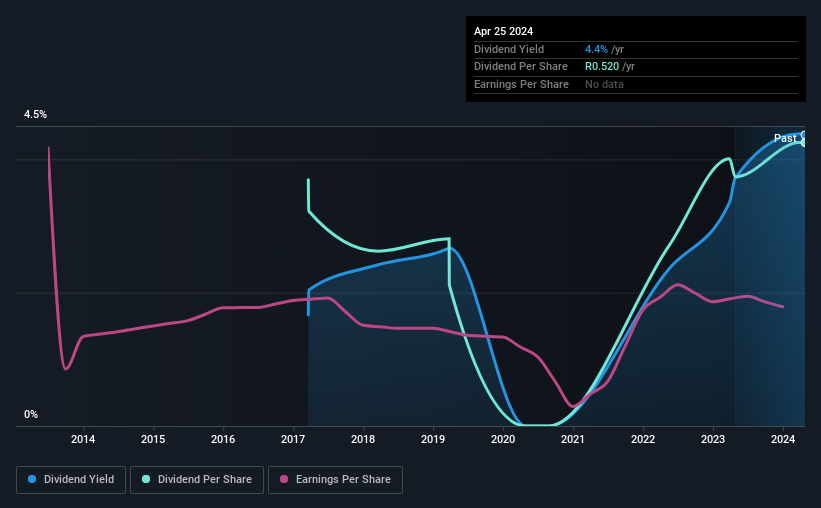- South Africa
- /
- Metals and Mining
- /
- JSE:MDI
Master Drilling Group (JSE:MDI) Is Paying Out A Larger Dividend Than Last Year
The board of Master Drilling Group Limited (JSE:MDI) has announced that it will be paying its dividend of $0.525 on the 20th of May, an increased payment from last year's comparable dividend. This takes the annual payment to 4.4% of the current stock price, which is about average for the industry.
Check out our latest analysis for Master Drilling Group
Master Drilling Group Is Paying Out More Than It Is Earning
Unless the payments are sustainable, the dividend yield doesn't mean too much. Before making this announcement, Master Drilling Group was paying a whopping 313% as a dividend, but this only made up 21% of its overall earnings. A cash payout ratio this high could put the dividend under pressure and force the company to reduce it in the future if it were to run into tough times.
EPS is set to grow by 4.1% over the next year if recent trends continue. Assuming the dividend continues along recent trends, we think the payout ratio could reach 386%, which probably can't continue without starting to put some pressure on the balance sheet.

Master Drilling Group's Dividend Has Lacked Consistency
Looking back, Master Drilling Group's dividend hasn't been particularly consistent. This suggests that the dividend might not be the most reliable. Since 2017, the dividend has gone from $0.0237 total annually to $0.0273. This means that it has been growing its distributions at 2.0% per annum over that time. We're glad to see the dividend has risen, but with a limited rate of growth and fluctuations in the payments the total shareholder return may be limited.
The Dividend's Growth Prospects Are Limited
Growing earnings per share could be a mitigating factor when considering the past fluctuations in the dividend. However, Master Drilling Group has only grown its earnings per share at 4.1% per annum over the past five years. Earnings growth is slow, but on the plus side, the dividend payout ratio is low and dividends could grow faster than earnings, if the company decides to increase its payout ratio.
In Summary
In summary, while it's always good to see the dividend being raised, we don't think Master Drilling Group's payments are rock solid. While the low payout ratio is a redeeming feature, this is offset by the minimal cash to cover the payments. We would be a touch cautious of relying on this stock primarily for the dividend income.
Market movements attest to how highly valued a consistent dividend policy is compared to one which is more unpredictable. However, there are other things to consider for investors when analysing stock performance. Taking the debate a bit further, we've identified 2 warning signs for Master Drilling Group that investors need to be conscious of moving forward. If you are a dividend investor, you might also want to look at our curated list of high yield dividend stocks.
New: Manage All Your Stock Portfolios in One Place
We've created the ultimate portfolio companion for stock investors, and it's free.
• Connect an unlimited number of Portfolios and see your total in one currency
• Be alerted to new Warning Signs or Risks via email or mobile
• Track the Fair Value of your stocks
Have feedback on this article? Concerned about the content? Get in touch with us directly. Alternatively, email editorial-team (at) simplywallst.com.
This article by Simply Wall St is general in nature. We provide commentary based on historical data and analyst forecasts only using an unbiased methodology and our articles are not intended to be financial advice. It does not constitute a recommendation to buy or sell any stock, and does not take account of your objectives, or your financial situation. We aim to bring you long-term focused analysis driven by fundamental data. Note that our analysis may not factor in the latest price-sensitive company announcements or qualitative material. Simply Wall St has no position in any stocks mentioned.
About JSE:MDI
Master Drilling Group
An investment holding company, provides specialized drilling services to blue chip major and mid-tier companies in the mining, civil engineering, construction, and hydroelectric power sectors.
Flawless balance sheet with solid track record.
Market Insights
Community Narratives



